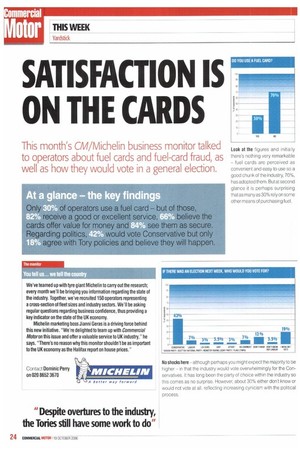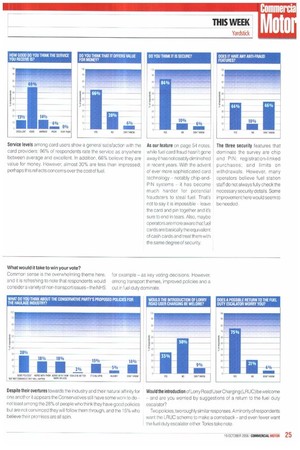SATISFACTION IS
Page 24

Page 25

If you've noticed an error in this article please click here to report it so we can fix it.
ON THE CARDS
This month's CM/Vlichelin business monitor talked to operators about fuel cards and fuel-card fraud, as
well as how they would vote in a general election.
At a glance — the key finding
f operators use a fuel card but of those, receive a good or excellent service, believe the
cards offer value for money and see them as secure. arding politics, would vote Conservative but only
agree with Tory policies and believe they will happen.
Look at the figures and initially there's nothing very remarkable fuel cards are perceived as convenient and easy to use so a good chunk of the industry, 70%, has adopted them. But at second glance it is perhaps surprising that as many as 30% rely on some other means of purchasing fuel.
Service levels among card users show a general satisfaction with the card providers: 96% of respondents rate the service as anywhere between average and excellent, In addition, 66% believe they are value for money. However, almost 30% are less than impressed; perhaps this reflects concerns over the cost of fuel.
As our feature on page 54 notes. while fuel card fraud hasn't gone away it has noticeably diminished in recent years. With the advent of ever more sophisticated card technology notably chip-andPIN systems — it has become much harder for potential fraudsters to steal fuel. That's not to say it is impossible leave the card and pin together and it's sure to end in tears. Also, maybe operators are more aware that fuel cards are basically the equivalent of cash cards and treat them with the same degree of security.
The three security features that dominate the survey are chip and PIN; registration-linked purchases; and limits on withdrawals. However, many operators believe fuel station staff do not always fully check the necessary security details. Some improvement here would seem to be needed.
You tell us... we tell the country
We've teamed up with tyre giant Michelin to carry out the research; every month we'll be bringing you information regarding the state of the industry. Together, we've recruited 150 operators representing a cross-section of fleet sizes and industry sectors. We'll be asking regular questions regarding business confidence, thus providing a key indicator on the state of the UK economy.
Michelin marketing boss Jianni Geras is a driving force behind this new initiative. "We're delighted to team up with Commercial Motoron this issue and offer a valuable service to UK industry," he says. "There's no reason why this monitor shouldn't be as important to the UK economy as the Halifax report on house prices."
No shocks here although perhaps you rr'ight expect the majority to be higher in that the industry would vote overwhelmingly for the Conservatives. It has long been the party of choice within the industry so this comes as no surprise. However, about 30% either don't know or would not vote at all, reflecting increasing cynicism with the political process.
What would it take to win your vote? Common sense is the overwhelming theme here, and it is refreshing to note that respondents would consider a variety of non-transport issues—the NHS
for example — as key voting decisions. However, among transport themes, improved policies and a cut In fuel duty dominate.
Despite their overtures towards the industry and their natural affinity for one another it appears the Conservatives still have some Vs/OrK to do — not least among the 28% of people who think they have good policies but are not convinced they will follow them through, and the 15% who believe their promises are all spin.
Wouldlhe introduction of Lorry Road User Charging (LRUC) be welcome — and are you worried by suggestions of a return to the fuel duty escalator?
Two policies, two roughly similar responses. A minority of respondents want the LRUC scheme to make a comeback — and even fewer want the fuel duty escalator either. Tories take note.


























































































































































































